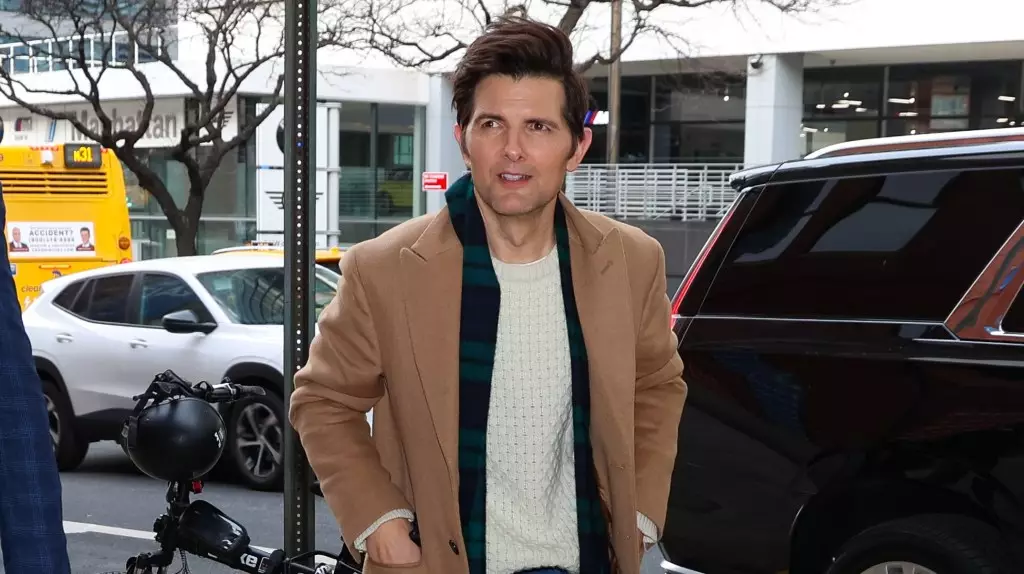The marketing approach recently undertaken by the cast of Apple TV+’s hit series *Severance* offers a fascinating glimpse into how television can blur the lines between fiction and reality. In a striking event, the cast, including Adam Scott and Patricia Arquette, transformed a portion of New York City’s Grand Central Terminal into a representation of the infamous Lumon Industries office. While celebrated as a creative promotional effort, the enterprise also inadvertently echoed the unsettling work conditions satirized within the series, raising questions about modern work culture and audience perception.
The decision to recreate the austere environment of Lumon Industries within a bustling public space served as more than just a clever marketing ploy. It acted as a mirror reflecting society’s relationship with corporate culture, surveillance, and the often monotonous routines workers endure. During a humorous yet revealing segment on *The Late Show with Stephen Colbert*, Adam Scott described the three-hour experience, where he and fellow cast members sat in the confined space mimicking the show’s rigorous work culture. The irony present in their decision to engage in “boring, monotonous office work” while being observed by curious onlookers speaks volumes about both their commitment to their roles and the prevailing attitudes towards work in contemporary society.
The Meta Commentary on Surveillance and Work Ethics
*Severance* serves as a profound critique of today’s work ethos, particularly concerning surveillance and the psychological implications of separating professional identity from personal identity. While promoting the new season, the cast’s playful nod to these themes crucially highlighted the ongoing dialogue surrounding employee autonomy and corporate oversight. During the promotional event, Scott faced questions not just from the media but from his own children, reflecting a growing interest in the series that critiques the very structure of conventional employment. This duality demonstrates the show’s cultural resonance, as viewers grapple with their workplace realities while consuming a narrative that scrutinizes those same dynamics.
Scott recounted the comedic aspects of their performance, including the absurdity of maintaining their roles without the basic human need to use the restroom. This anecdote further emphasizes the lengths to which the cast members went, enveloping themselves in their characters to deepen the audience’s reality-altering experience. The fact that Scott’s computer malfunctioned during their stint showcases the unpredictability and challenges often present in the workplace—a subtle nod to the show’s commentary on the chaos of modern labor.
Moreover, his reflection on physically embodying his character while running through the Lumon office invokes a sense of physicality associated with the role. The homage to Tom Cruise’s infamous running style hints that portraying a character fully involves not just mental but physical commitment, showcasing Scott’s dedication to bringing authenticity to his work.
The buildup to Season 2 of *Severance*, which premiered shortly after the marketing stunt, was teeming with excitement. Audience anticipation for the continuation of the plot—where employees have chosen to sever their work lives from their personal lives—mirrors broader societal tensions about the work-life balance. Offering insights into how companies manipulate personal identity for profits, *Severance* encourages viewers to reconsider the implications of their own work experiences.
This season has drawn an enthusiastic response from critics and fans alike, demonstrating the series’ effectiveness at prompting substantive conversations about autonomy, identity, and the implications of technological advancement on the modern workplace.
The Lumon Industries pop-up in Grand Central Terminal provides a rich case study of how public engagement with art can mirror and critique societal norms. Not only does it serve as clever marketing, but it also invites observers to reflect on their own work environments and the influence of corporate culture on individual lives. As *Severance* continues to unravel its narrative complexities, its connection between fiction and the realities of work culture will remain pertinent, pushing viewers to question the structures that define their daily lives.
